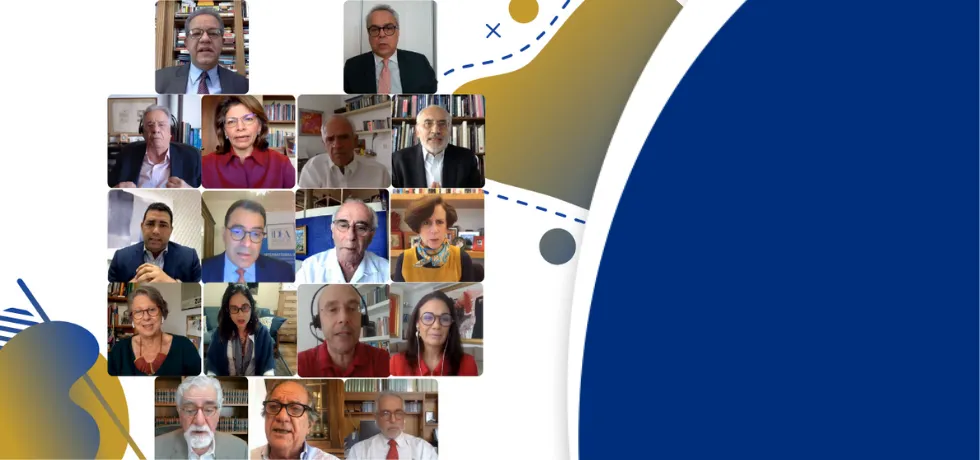Former AL Presidents close the V International Forum of Santo Domingo with a call for integration

Five former presidents of Latin America were of the view that Latin America has to achieve integration to be able to seek solutions to the economic and social challenges facing the region, as well as the health challenges posed by the spread of COVID-19. Former presidents Leonel Fernández of the Dominican Republic, Laura Chinchilla of Costa Rica, Fernando H. Cardoso of Brazil, Carlos Mesa of Bolivia, and Ernesto Samper of Colombia shared thoughts on Tuesday and Wednesday, January 26 and 27 during the V International Forum of Santo Domingo.
Este artículo está disponible en español.
Before concluding the meeting Fernández proposed to the former presidents that they formally call on the foreign ministers of Latin America to engage in a dialogue to come up with economic and health responses to the situation facing the weak Latin American states.
The former heads of state agreed on the need to try to achieve the long-sought integration to attain common purposes including strengthening the demand for products from the region in the major markets. The goal is to find points of agreement amidst the differences, with vaccines for COVID-19 and credit facilities for economic recovery as priorities.
The topic of the final session was “The New Reality of Latin America: Reflections and Projections.” It was moderated by Daniel Zovatto, regional director for Latin American and the Caribbean of International IDEA and academic coordinator of the conference.
With respect to Brazil, Cardoso emphasized that the pandemic has further revealed the social inequality stemming from the loss of jobs. “We also see that the region may be affected by social discontent due to the economic problems facing the population,” he said, adding that “instability is aggravated to the extent that people feel they cannot get ahead.”
“If we wish to do something, it has to be together,” he added, a reference to the need for Latin American unification to confront the challenges posed by the pandemic.
Samper referred to the societal changes that should result from the crisis. There’s a need to regain lost ground, taking up anew a set of measures that includes economic recovery, he said, reiterating that integration is the key. He underscored the “spectacle” of each country in the region looking for the vaccine on its own as evidence of the need to seek joint solutions.
Multilateralism must be pushed by bolstering regionalism, the former president of Colombia said, noting that just a handful of countries account for the production of 90% of the vaccines, as some call for a halt to their export. He said that the countries face a moral dilemma in which they need to reconcile survival with the obligation to find common ground and get along.
Chinchilla also pointed to the need for coordinated efforts in the region in order to get economic support and solutions to the demand for health services in the face of the pandemic, including assuring the supply of vaccines for the region. She emphasized the structural changes that the Latin American economies need on the basis of productivity and innovation, among other factors. She also addressed worsening inequality, pointing to the loss of connectivity in households. She also made reference to the problems of governability caused by political disaffection and the troubles the population is facing.
Mesa spoke of the need to achieve the “engagement of Latin America” (“interlocución de América Latina”) with the multilateral agencies to respond to the pandemic and the structural economic problems of the region, to secure, among other things, a system for financing these needs that benefits all. Regarding the political situation, he highlighted the virus of contemporary political messianism as another challenge, among other problems faced by the democracies in all the countries, amidst the pandemic and democratic ruptures.
Fernández agreed that integration is necessary in the region to be able to obtain economic resources and offer strategies for the health problem with the help of international organizations. He said that it’s necessary to take advantage of upcoming meetings of multilateral agencies to seek solutions through a global fund that makes it possible to help the region.
“This is a crisis that is associated with death, with the restriction of liberties, with what is represented by being on lockdown, in isolation, among other situations; and a crisis of that magnitude, of these dimensions, with these unprecedented characteristics, that is the main challenge,” he argued.
The former presidents answered three questions put to them by the forum, which was organized by International IDEA and the Fundación Global Democracia y Desarrollo (Funglode): Will the current crisis get Latin America and the Caribbean to articulate a more consensus-based agenda for the Latin American region? What measures will need to be applied to get the region back on the path to development and economic growth that it experienced during what was known as its “golden decade”? And: What role will the Latin American community play in international fora?
To watch the full video, please click here .
Before the former presidents spoke, Session 4 addressed the topic “Politics, elections, and governability in an uncertain global setting.” The speakers were Kevin Casas- Zamora, Sergio Bitar, María Victoria Murillo, Maria Hermínia Tavarez, and Denise Dresser. Link to the video.
“(Dis)integration: A geopolitical analysis of the Latin American Region,” was the topic of session 5, with analyses presented by Celso Lafer, Diego García-Sayán, Isabel de Saint Malo, and Sergio Abreu. Reproduce the video with their presentations here.



